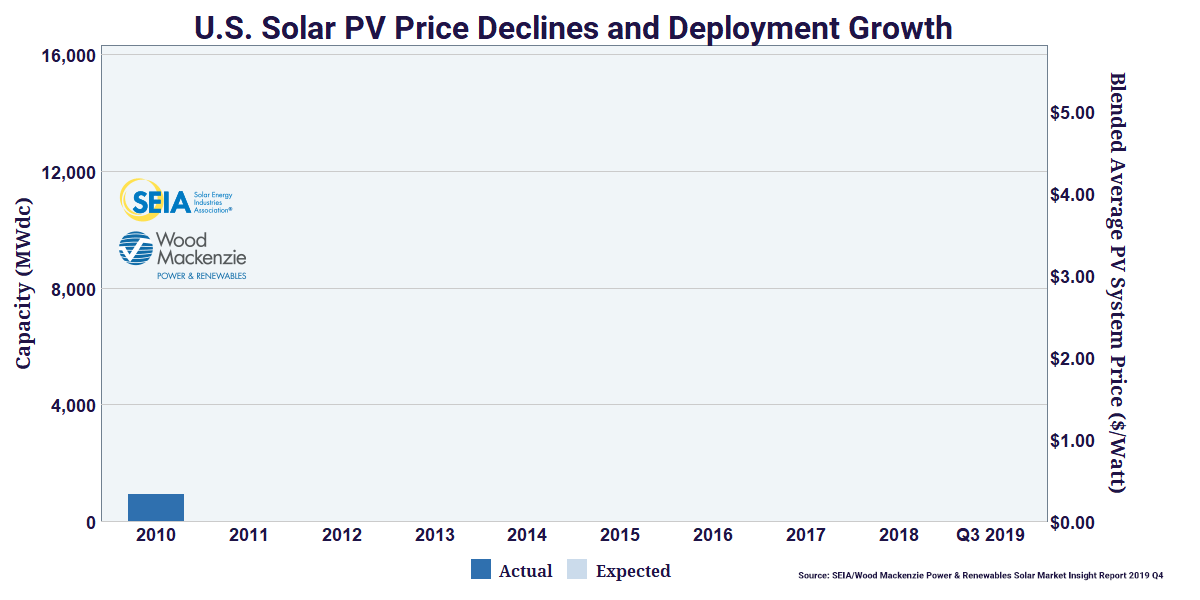Solar Gains Are Evidence of the ITC’s Success and Why It Should Continue
The latest quarterly data on solar growth shows just how resilient this industry is. Even with misguided tariffs that make U.S. solar systems among the most expensive in the world, fifteen states (and the country as a whole) posted their best quarter ever for residential solar in Q3 2019. Just imagine how many states could have had a record-breaking quarter and how much closer we’d be to our next million solar installations if these tariffs weren’t in place.
The U.S. solar market would undoubtedly look better if it weren’t for this policy, but one bright spot helping to keep solar booming, the solar Investment Tax Credit (ITC), will begin to expire at the end of 2019. The solar ITC is a major driver of U.S. solar growth across all sectors. In the third quarter of this year, the overall solar market grew 45% year-over-year from Q3 2018, adding 2.6 gigawatts (GW) of new solar capacity.

With all those gigawatts come thousands of jobs and billions of investment dollars that help to drive local economies. This is partly why the solar ITC polls so well in every community, regardless of geography or political affiliation. The ITC supports the entire solar supply chain and a range of businesses from material and component suppliers to racking and construction businesses. Not to mention, the jobs these solar businesses create, the homeowners getting clean, affordable electricity, and Mom and Pop shops up and down Main Street all benefit from this tax credit.
This isn’t just in traditional solar states like California, Nevada and North Carolina. Homeowners in nascent markets from Idaho to Iowa are seeing the value of solar and are installing it at record clips. This demand translates to new businesses and new jobs, but allowing the ITC to expire would significantly limit solar growth in these up-and-coming states.
In addition to economic benefits, CO2 reduction from record-setting growth in Q3 may not continue if we don’t act now. Congress must extend the ITC now to take meaningful steps to address climate change. Lawmakers on both sides of the aisle have made claims about their commitment to lower carbon emissions; the only way for them to make serious progress this year is extending the ITC.
Solar, especially when paired with low-cost energy storage, can play a significant role in overcoming these challenges. Studies have shown that extending clean energy tax credits like the solar ITC can help to take a significant chunk out of the climate goals set in the Paris Agreement. That means millions of metric tons of CO2 out of the atmosphere and cleaner air for everyone.
SEIA president and CEO Abigail Ross Hopper said it best: “This is the kind of growth and investment we could see going forward if we make smart policy moves, like extending the solar Investment Tax Credit and stopping additional tariffs. Failure to make these policy moves will limit deployment potential and cost jobs.”
Extending the ITC would be a significant win for the climate and economy that Congress should not pass up. It’s a proven policy that helps drive clean energy growth – the latest quarterly data is proof of that.
Whether you’re a Democrat, Republican, or somewhere in between, the bottom line is clear: To protect jobs, the economy, and the environment, it’s crucial to extend the solar tax credit and nix harmful tariffs. Now is the time to urge your representatives in the House and Senate to take action and extend the solar ITC before the end of the year.
Fill out this form to contact your representatives. The future success of our industry depends on it.


